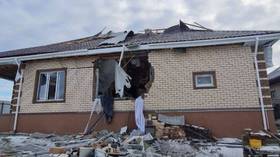Crisis control in Ukraine
Ukraine's economic woes have forced politicians to temporarily put their differences aside and pass anti-crisis laws to help the struggling economy.
President Yushchenko was scheduled to hold on online news conference this week, but it was cancelled. While the forum for questions was sprinkled with mocking questions, the main concern on people's minds was the economy.
Ukraine has been victim to Europe's highest double digit inflation for the last two years. Now experts are calling it an economic free-fall as the Hrivna, the country's currency, has lost half its value since September.
Economist Andrey Blinov does not see any relief in the near future.
“It is very serious, because we have a drop in demand for metals of at least 50 percent. In general, steel plants are running at one third capacity. You have to understand that it is a drop of at least 50 percent in all export sectors. In the first quarter of 2009 the Ukranian economy will go into recession,” said Blinov.
Ukraine is heavily dependent on industrial exports. Production has just been halted in at the largest steel factory in Eastern Europe which is located in the Ukrainian city of Krivoi Rog.
As of yet, most major businesses have not begun shedding staff, but many experts believe if the situation does not improve, more than a million people nationwide could lose their jobs.
However, the crisis is has not being helped by the on-going political conflict in Kiev. Prime-minister Timoshenko has demanded President Yushchenko resigns on the grounds that he has led the country into turmoil.
While their parties have managed to form a new coalition to deal with the crisis, the results so far have yet to materialise. The reconciliation also appears to have little backing from the people, with mass protests planned for next Tuesday.
Many say this is just the beginning.












